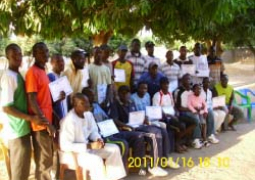Aiming to generate wealth, improve food security and accelerate socio-economic development for Africa's people, African ministers of fisheries are meeting, for the first time, in Banjul on production and marketing strategies for fish and aquaculture production.
The conference, which comes in the wake of tremendous progress registered by the continent since 2005 in restoring fisheries and aquaculture on the priority of national and regional development, is organised by the Department of the Rural Economy and Agriculture of the African Union Commission (AUC) in collaboration with the New Partnership for Africa's Development (NEPAD).
Presently under way at the Sheraton Hotel in Brufut, the conference, among others, aims to facilitate information sharing in selected technical areas, and engage participants at political level to ensure dialogue and a concerted voice on critical development issues in the sector.
In his remarks to officially open the meeting of experts, Lamin Kaba Bajo, Minister of Fisheries and National Assembly Matters underscored the immense contributions of the fisheries sector towards African development, noting that the sector makes a vital contribution to food and nutrition security for over 200 million Africans, and provides income for over 10 million Africans who are engaged in fish production, processing and trade.
According to Minister Bajo, despite fish being the leading export commodity for Africa, the benefits are still at risk as the exploitation of natural fish stocks are reaching their catch limits, and aquaculture production is yet to attain its potential.
"This meeting will help a lot in finding solutions through exchange of ideas and experiences, sharing knowledge and understanding of some important technical and policy issues for defining solutions for the sustainable exploitation of our fisheries resources and the development of aquaculture," he said.
Dr. Babagana Ahmadu, FAO country representative, in a statement said the fact that 10 million Africans get their livelihoods or employment from the fishing industry is enough evidence of the importance of fishing in African economies. The fisheries sector, he added, makes a vital contribution to meeting the food and nutrition security needs of millions of Africans, and has become a leading export commodity with an annual export value of US$2.7 billion.
According to the FAO official, the per capita fish supplies against increasing demands are dropping, and the increase in illegal marine fisheries by foreign ships is on the increase, threatening the livelihood of millions in Africa.
Africa, he said, presents an untapped investment frontier for aquaculture, and that most countries are doing a lot to stimulate the industry.
"The African fisheries sector has the potential to contribute about 6% of the continents annual economic growth, and yet Africa has a low capacity to deal with this challenge because of shortage of information, technology, skills, economic resources and threat by climate change, among others," Dr. Ahmadu added.
Tim Bostock, DfID's Fisheries Advisor, said the failure of fisheries to generate wealth and contribute sustainably to national growth is far from being an African problem. "Take the parlous state of many European fisheries. In the UK, although we have dealt effectively with illegal fishing, a recent study demonstrated just how unproductive our fishing industry actually is," he stated, adding that this indicates that structural reforms towards more effective rights had the potentials to deliver a considerable hike in economic returns from a fleet size approximately half of its currents capacity-achieving more with far less.
Dr. Ibrahim Assane Mayaki, Chief Executive Officer NEPAD Planning and Co-ordinating Agency, urged the delegates to make best use of the forum to come up with clear recommendations to accelerate the development of the fisheries sub-sector.
Dr. Mayaki noted that many regional economic communities have now finalised their CAADP Compacts with his agency, and many of the countries have chosen fisheries as one of the key drivers of the agricultural growth.
Tumusimi Roda Peace, Commissioner for Rural Economy and Agriculture of the African Union Commission, in a statement called for the need for expertise to devise the most sustainable options that will help the continent optimise its fisheries wealth and resources.
According to him, the success attained so far is the product of the many summits calling for reduction of poverty and food security in Africa. He added that fisheries and other aquatic resources will always complement the food basket approach to food security, as well as alleviation of poverty among fisher folks.
The meeting of experts will be followed by that of AU ministers of fisheries on Thursday.


